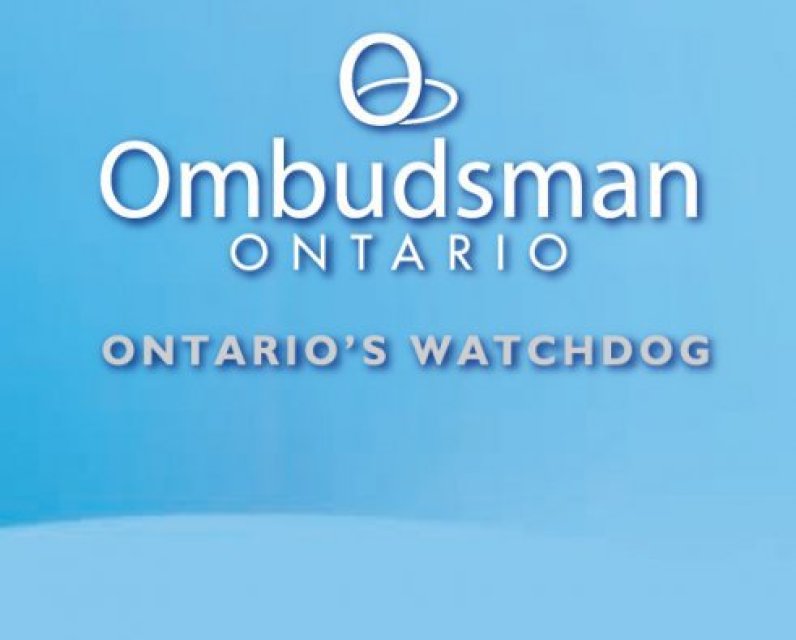Unpublished Opinions
Syndicated #cdntech #cdnpoli #onpoli blogger. Cutting out the political spin to get the info that matters. Retired EDM DJ. Father to a son with autism.
Twitter: @jkobopoli
Contact E-mail: jkobopoli at rogers dot com
Ontario Ombudsman: A Watch Dog That Isn’t Watching PT.1

Authorized by Jason Koblovsky
The Ontario Ombudsman’s office recently got new powers to investigate school boards, municipalities and universities. The early months of these new expanded powers has seen this office more run like a customer service wing of government rather than one with investigative powers to resolve issues. In fact, the Ontario Ombudsman hasn’t launched any investigations at all on the complaints they are receiving as a result of those expanded powers.
I’ve been a strong advocate in the past and a strong voice within the victims rights community with respect to expanding the Ontario Ombudsman’s office powers to investigate school boards. Even starting a facebook group to push for new legislation in 2010 and featured in local media. Advocates I’ve worked with before in the victims rights community are reporting that the Ombudsman’s office is refusing to investigate issues at the school board level, often disposing of complaints without a full resolution, or investigation. There have been no investigations on the complaints received against school boards since her expanded powers came into effect in September 2015.
I’ve recently got a call from the Ombudsman on a complaint I was sure the office would investigate. It’s well within this offices jurisdiction to investigate. As a result of my own family situation in having a wife and child who are autistic, I’ve had to put a lot of my life on hold to take care of my family. It’s a full time job, on top of the problems we’ve encountered in the housing system, and also having to fight tooth and nail for services my son needs. We live in social housing.
My family and I have been through hell over the past two years while I started my own probe into the public housing sector to see what problems within the law are creating an environment ripe for abuse and fear. Many who qualify for housing and are on waiting lists may not be getting a fair shake as a result of the lack of accountability and legal enforcement primarily as a result of lobbyists efforts on legislation, and inaction of government to deal with a crisis situation. Money allocated at all levels of government may not be making it’s way to where it’s needed most to improve the system, nor improve living conditions for those who are living in social housing. This is especially important now to come forward with all of this due to the influx of refugees, and commitments from all levels of government to hand out more money for affordable housing. The last thing we all want is for these people to move from one dictatorship to another.
A lot of our most vulnerable in our society are being taken advantage of and squashed like little ants, in large part due to a huge troll of a lobby group called the Canadian Co-Operative Housing Federation of Canada (CHFC). There’s a lot of money I’m suspecting in the system that is unaccounted for, primarily as a result of our politicians not taking co-operative members with any serious credibility. Someone needs to investigate the amount of abuse in the system, in order to better improve financial accountability, and ensure that civil rights of low income individuals who require affordable housing are being actively respected. The Ombudsman’s office is refusing to investigate, and told me to follow up with my MPP. So here is my letter to MPP Julia Munro:
------
Ms. Munro,
I contacted your office last week regarding my Ombudsman complaint against York Region being punted back to your office as a result of a change in the law that is required to ensure financial accountability within the co-operative housing sector.
There are now two issues attached to this. The first is the utter refusal of the Ombudsmans office to investigate the system that is in place for not just financial accountability issues but what I would suspect to be a huge number of civil rights issues due to the way the Co-operative Corporations Act is enforced. I was a huge advocate to get the Ombudsman involved in investigating complaints regarding the MUSH sector. I’m hearing from anti-bullying advocates and also through my experience that the Ombudsmans office is currently disposing of complaints that are well within its jurisdiction and mandate to investigate. I was told by this office that since I think there needs to be a change in law they would not investigate my complaint told me to get a hold of you all the while claiming to the public that the office looks for accountability issues and works with Government to make proper changes to legislation to improve the system (which is the basis for my complaint into the Ombudsman in the first place):
https://twitter.com/Ont_Ombudsman/status/693117936748331008
Myself and quite a few that advocated for the Ombudsman’s oversight of the MUSH sector will be coming forward publicly on our concerns regarding the conduct of this office since they have been granted expanded powers. That’s the first issue.
The second issue is how the law and legislation is enforced under the Co-operative Corporations Act. In order for the co-operative or members of the co-operative to enforce bi-laws or breach of bi-laws passed by the members, it requires an expensive trip to the Ontario Superior Court of Justice (SCJ). In 2013, the Ontario Legislature introduced Bill 14 Non-profit Housing Co-operatives Statute Law Amendment Act, 2013, which essentially allows for the co-operative to enforce evictions by way of the Landlord Tenants Board (LTB) under certain circumstances. This amendment does NOT allow members of the co-operative to approach the LTB to get their concerns regarding mismanagement and harassment of boards, and staff to be addressed. Members must still file at the SCJ. An excellent article on the passing of Bill 14 Non-profit Housing Co-operatives Statute Law Amendment Act and the concerns regarding that act is here:
http://rabble.ca/news/2014/01/evictions-all-what-effects-will-bill-14-have-on-co-op-residents
Essentially since the conception of the Co-operative Corporations Act in 1990, there has been only one co-operative member that made it to present her case before the SCJ. The rest have been fought out of court on legal technicalities. Something that the Canadian Co-Operative Housing Federation of Canada (CHFC) acknowledged in 2013 during testimony before the standing committee on Bill 14 Non-profit Housing Co-operatives Statute Law Amendment Act. It’s also worthy of note that only a few co-operative members were able to provide testimony in the 2013 committee and time allocated for these members to speak in committee was dramatically cut compared to those who represent the co-operative sector, most likely due to the lobby efforts of CHFC.
Every lawyer that I’ve approached on my specific situation here has told me to basically shut up and not to speak out as a result of legislation being highly lopsided towards co-operative administrators and boards. My worry is as a result of the lack of enforcement of the Co-operative Corporations Act and lack of enforcement of member passed bi-laws as a result, some boards and admins (as the case in my situation) feel that they are above the law, threaten and harass members from coming forward or exercising the democratic spirit of the act and co-operative living (several co-operative members came forward with similar concerns in committee on Bill 14 in 2013). If there’s no accountability under the act, I suspect the system is ripe for abuse of public funds, and also civil liberties that need to be properly looked at. In fact, Durham Region Police posted one specific example of how things can get out of control due to the lack of enforcement, and members afraid of speaking out that amounted to fraud, in which Durham Regional Housing refused to provide proper legal assistance to ensure that money lost was recovered:
What co-operative members need is the LTB to handle complaints by members with respect to bi-law enforcement on boards and co-operative staff. Having low income members shoulder full costs of enforcement of the act is representative of how lopsided the law has become and the utter decimation of our rights as co-operative members under law. The co-op has money to enforce their rights under law, but us members have no money, and no affordable legal assistance to bring that enforcement to bear. CHFC has been handling a lot of these complaints outside of court, however CHFC is quite obviously NOT the appropriate place to bring concerns regarding boards and admins, since they are the primary lobby group for the co-operative housing sector, and their primary focus is to protect co-operative boards and staff, not members as cited in my Ombudsman’s complaint.
I hope you guys can help. I’m tiring real fast on being pointed in every which direction, because no one wants to deal with this, and I’m getting real sick of this. My family has been through enough.
The issues here, fall directly within the Ombudsmans jurisdiction and new powers to investigate. A huge amount of evidence was provided to this office, including e-mail chains from the Region of York, and York Regional Council, actively refusing to look at financial accountability issues that are present in the system.
-----
The second part of this post will deal specifically with the Ombudsman quickly disposing of complaints made against school boards in the province. If you have filed a complaint into the Ombudsman since their expanded powers. I would like to hear from you. Please e-mail me your stories at jkobopoli at rogers dot com.



Comments
Be the first to comment